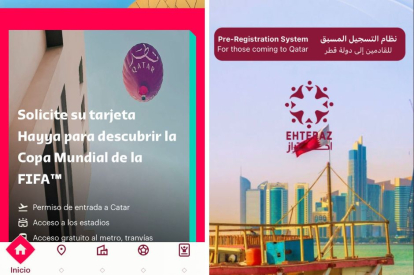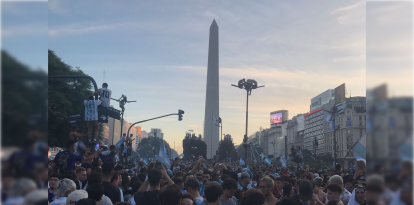Qatar to access fans' personal data during the World Cup
The regime forces the download of Ehteraz and Hayya applications and will have unlimited access to the privacy of fans.

El emir de Qatar Tamim bin Hamad al Thani (Cordon Press)
With one month to go until the 2022 World Cup kicks off (November 20), every fan traveling to the country during the tournament is required to download Ehteraz and Hayya software on their cell phones. With these two applications, the Doha authorities want to keep track of each person during their stay in the Qatari country.
Security experts believe that the apps' terms and conditions do not respect the privacy of fans. NRK's head of security, Øyvind Vasaasen, noted that people will hand over all their personal information:
Vasaasen compared allowing access to your data to handing over the keys to your house:
Unlimited access to personal data
Qatar's Ministry of Interior developed Ehteraz, an application operated by the Ministry of Public Health with which the Qatari regime can track and control the spread of the coronavirus. Similar to the covid passport, the authorities implemented this application in 2020 and it was widely discussed among the society.
At the time of installation and first use, Ehteraz requires personal information such as telephone number, passport or visa number and nationality. In addition, the application asks each person for access to their personal content, from photos to their address book or passwords. It also modifies the wifi and Bluetooth connection, prevents screen locking and requires GPS location at all times.

Qatar Apps
Hayya is the official application of the Qatar 2022 World Cup. With this application - which has already been used for the Tokyo 2020 Olympic Games - fans will be able to follow the news of the tournament, apart from having their tickets and free access to public transport.
Of course, once the application is downloaded, fans will have to authorize Hayya's access to their personal information, location and network connections, just as with Ehteraz. In addition, personal data is transferred insecurely and cannot be deleted.
Qatar bans
In addition to controlling fans, Qatar has its own restrictions. When entering the country, Qatar (as a Muslim country) does not allow the entry of books of other faiths or religions. In addition, no alcoholic beverages or pornographic material may be brought into Qatar. Clothing such as miniskirts, sleeveless clothing or shorts are also prohibited.
Alcoholic beverages may only be consumed in places authorized by the regime (such as hotels). It will not be allowed to walk on the streets while intoxicated. Alcohol will be sold in the stadiums, but you will only be able to drink inside the venue and not go out in the street with the glasses.
Sexual relations between unmarried persons are punishable by up to seven years imprisonment. Kissing and shaking hands will also be under surveillance, as they will be very limited. On homosexuality (forbidden in Islamic law), the Qatari regime will accept all people regardless of their sexual status, but asks that they do not expose their habits in public.
6,500 workers killed
Ten years after the Fédération Internationale de Football Association (FIFA) chose Qatar to host the 2022 World Cup, the Doha regime prepared to host one of the most important sporting events on the planet. According to a report in the newspaper The Guardian, so far 6,500 non-Qatari workers have died while working on the construction site . They were subjected to harsh working conditions, working at high altitudes and in high temperatures in the sun while building the stadiums and infrastructure needed for the tournament.
The World Cup is always held between June and July. Due to the high temperatures in Qatar at this time of the year, this is the first time the tournament has been held on a different date. The organizers decided that it would be held between November and December.
Opposition to Qatar 2022
The sports company Hummel, which dresses the Danish national soccer team, decided to remove its logo from Danish jerseys as a symbol of protest against the Qatari regime and the working conditions to which workers are subjected.
The Qatari regime's influence in hosting the tournament sparked numerous reactions against it. Hummel was not the first to take a stand against holding the World Cup in Qatar. Norwegian comedian and artist Rasmus Wold reflected his criticism of the World Cup and FIFA with his song Never Mind the Slavery.
The Norwegian soccer team wore T-shirts with the slogan "Human Rights on and off the pitch" as a protest against the working conditions of workers in Qatar.























